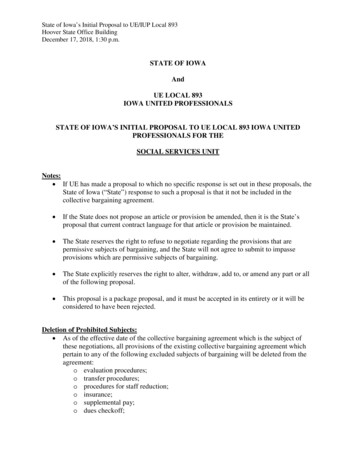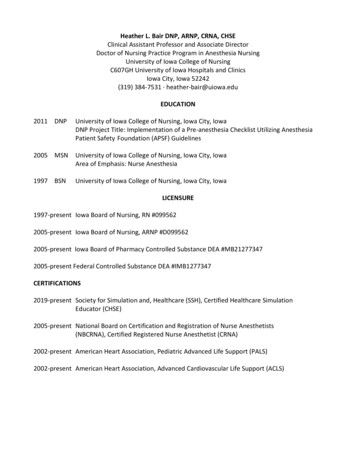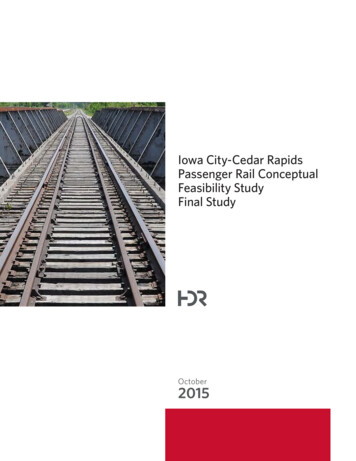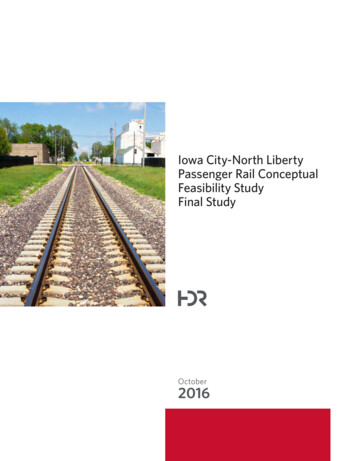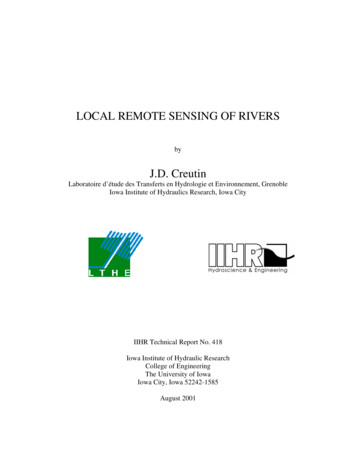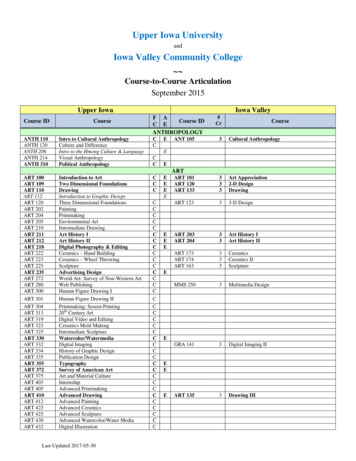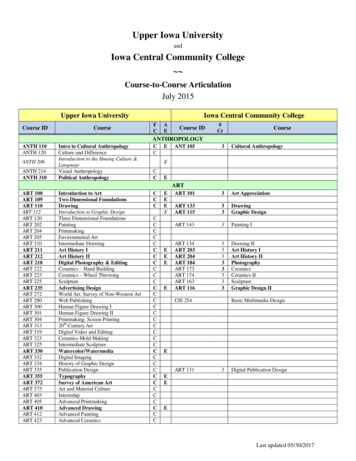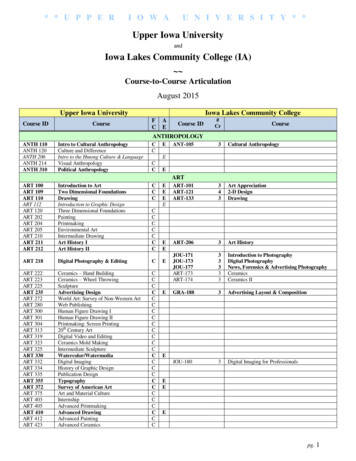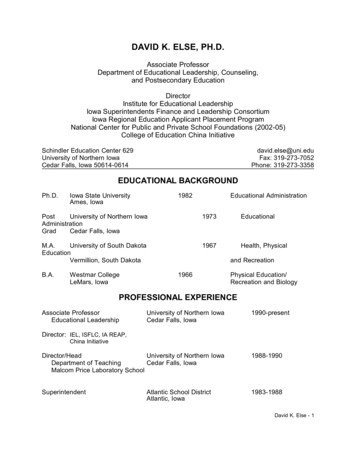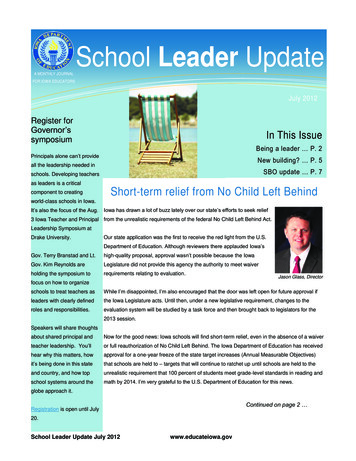
Transcription
HfdddSchool Leader UpdateA MONTHLY JOURNALFOR IOWA EDUCATORSJuly 2012Register forGovernor’ssymposiumIn This IssueBeing a leader P. 2Principals alone can’t provideNew building? P. 5all the leadership needed inSBO update P. 7schools. Developing teachersas leaders is a criticalcomponent to creatingShort-term relief from No Child Left Behindworld-class schools in Iowa.It’s also the focus of the Aug.Iowa has drawn a lot of buzz lately over our state’s efforts to seek relief3 Iowa Teacher and Principal from the unrealistic requirements of the federal No Child Left Behind Act.Leadership Symposium atDrake University.Our state application was the first to receive the red light from the U.S.Department of Education. Although reviewers there applauded Iowa’sGov. Terry Branstad and Lt.high-quality proposal, approval wasn’t possible because the IowaGov. Kim Reynolds areLegislature did not provide this agency the authority to meet waiverholding the symposium torequirements relating to evaluation.Jason Glass, Directorfocus on how to organizeschools to treat teachers asWhile I’m disappointed, I’m also encouraged that the door was left open for future approval ifleaders with clearly definedthe Iowa Legislature acts. Until then, under a new legislative requirement, changes to theroles and responsibilities.evaluation system will be studied by a task force and then brought back to legislators for the2013 session.Speakers will share thoughtsabout shared principal andNow for the good news: Iowa schools will find short-term relief, even in the absence of a waiverteacher leadership. You’llor full reauthorization of No Child Left Behind. The Iowa Department of Education has receivedhear why this matters, howapproval for a one-year freeze of the state target increases (Annual Measurable Objectives)it’s being done in this statethat schools are held to – targets that will continue to ratchet up until schools are held to theand country, and how topunrealistic requirement that 100 percent of students meet grade-level standards in reading andschool systems around themath by 2014. I’m very grateful to the U.S. Department of Education for this news.globe approach it.Continued on page 2 Registration is open until July20.School Leader Update July 2012www.educateiowa.gov
A must-read for Iowa educatorsWhat if we could crawl into the minds of highly successful people and observe how theythink and lead?Two Iowa school administrators did just that. Lowell Ernst, director of curriculum and instruction for the Pella Community School District, and Dave Versteeg, superintendent ofthe Montezuma Community School District, have conducted interviews with successfulpeople from various fields, including manufacturing, health care, and education.Their new report, “Leaders on Thinking,” summarizes the common themes from thoseinterviews, as well as steps that lead to better thinking. The Iowa Department ofEducation released the report in June in an effort to share the innovative work statewide.The report targets a broad audience, but it’s also applicable to Iowa schools.“Business leaders talk about what they need, and it’s always problem-solving, communication skills and understanding of others,” Ernst said. “If we’re asking students to develop higher-order thinking skills, we cannot develop tasks that only requireunderstanding and recall. We have to build our instruction so that students have that training to analyze and evaluate.”Watch a short video about the project at http://www.youtube.com/watch?v P D8UG-vWbE&feature youtu.be. Join theconversation at www.leadersonthinking.blogspot.com or on Twitter, using the hashtag #leadersonthinking. Continued from page 1, Short-term relief from No Child Left BehindTo be clear, freezing proficiency targets is a temporary and stopgap measure that really doesn’t address the root of theproblem. As a nation, we must make reauthorization and significant changes to the No Child Left Behind law a priority andaddress its flaws head on. Our children deserve better than tinkering and inaction. And our state deserves more than aone-size-fits-all accountability framework that unfairly blames schools serving more at-risk and disadvantaged students.Looking ahead, Iowa may play a key role in the work of No Child Left Behind reauthorization and revision through SenatorHarkin’s important position as Chairman of the Senate Health, Education, Labor, and Pensions Committee and through myinvolvement on a No Child Left Behind reauthorization advisory group with the Council of Chief State School Officers.A few other notes:If you haven’t already, be sure to read Leaders on Thinking (see the top of this page), an excellent new report.The Iowa Department of Education welcomes David Tilly, a Heartland Area Education Agency administrator, as DeputyDirector. David will oversee school accreditation, standards and curriculum, educator quality, Response to Intervention,special education, and early childhood. This position covers the biggest instructional levers we have to improve schools inIowa. David’s first day will be July 9.Don’t forget to register for the Iowa Teacher and Principal Leadership Symposium at Drake University on August 3. Registration is open until July 20.Have a happy and safe July 4! Thanks for all you do on behalf of our state, our schools, and our students.School Leader Update July 2012www.educateiowa.gov2
Teachers receivepresidential awardI-35 school cashes in on financial literacyInterstate 35 High School is at the head of the class in terms of financial literacy. Ateam from the school won this year’s video contest in honor of Financial LiteracyTwo Iowa teachers have received theprestigious Presidential Award forExcellence in Mathematics andScience Teaching. Karla Digmann ofDubuque received the award formath, and Jody Stone of Cedar Fallsreceived the award for science.Digmann and Stone are among 97Awareness Month observed in June. The contest, which focuses on creating a videoto teach peers about financial literacy, was sponsored by the Iowa College StudentAid Commission, Iowa Bankers Association and EverFi, Inc. In the picture, JohnSorensen, the president of Iowa Bankers Association, presents the 1,000 technologygrant to the winning team: Kristine Zuercher, business teacher and team mentor, andstudents Wyatt Oliver, Nick Petersen, Forrest Beeler, and Hunter Wearmouth. WatchInterstate 35 High School's winning video, "Saving Money,” as well as videos receivinghonorable mention at lenge.html.mathematics and science teachersnationwide to receive the awards.Winners receive a 10,000 awardfrom the National Science Foundationto be used at their discretion. Thewinners were selected by a panel ofdistinguished scientists, mathematicians, and educators following aninitial selection process done at thestate level. Each year the award alternates between teachers ofkindergarten through 6th grade andthose teaching 7th through 12thgrades. The 2011 awardees teach7th through 12th grades.C-Plan application opens, technical assistance availableThe new C-Plan application opened mid-June for district and school use. Please note that if you currently haveaccess on EdInfo to CSIP, APR, DDSDP, SINA/DINA or the Iowa Core Implementation Plan, you will have automaticaccess to C-Plan and will see the application on your EdInfo menu. If you do not have access to any of the fiveapplications above, please contact your local EdInfo security officer and request access to C-Plan.The Iowa Department of Education will host a July 10 webinar to provide technical assistance to local schools anddistricts as they input data into the new C-Plan application. The webinar runs from 10:30 to 11:30 a.m. Register here.More information will be forthcoming regarding training that the Department will provide to new users in August. If youhave questions or concerns, contact Lisa Albers at lisa.albers@iowa.gov or 515-281-0972, Karla Day atkarla.day@iowa.gov or 515-281-7145, or Janell Brandhorst at janell.brandhorst@iowa.gov or 515-281-3033.School Leader Update July 2012www.educateiowa.gov3
IVRS helping students with disabilitiesIowa Vocational Rehabilitation Services (IVRS) is a part of the Iowa Department ofMiss the specialeducation conference?Education and represents about 400 full-time staff. About 250 of the staff work in thevocational rehabilitation field, and another 150 work in the area of DisabilityMore than 1,200 participants filledHy-Vee Hall for Pursuing the Promise,Determination Services (DDS).the Iowa Department of Education’sThe DDS Bureau provides services involving the receipt and evaluations of claimsreceived from Iowa citizens with disabilities to determine their eligibility for economicsupport via Social Security Disability Insurance and Supplemental Security Incomefirst-ever statewide special educationconference on June 11-12. If youweren’t one of them, you can watchthe first day of the conference online.benefits. The program is totally federally funded.The Rehabilitation ServicesBureau of IVRS is funded with21.3 percent state dollars, which ismatched with 78.7 percent infederal dollars and is focused oncompetitive employmentoutcomes for individuals withdisabilities. Forty percent ofreferrals are generated from transition programs, and continued statewide efforts arebeing made to closely collaborate with high school education staff and area educationstaff to facilitate transition efforts for students with disabilities with a focus oncommunity-based, integrated, competitive employment.A full range of transition services can be provided to eligible students with a disabilityand this can include a wide variety of disabilities and functioning levels. Approximately 70 percent of the individuals who were successfully employed last year benefited from some type of post-secondary training. For those not interested in apost-secondary track, vocational counseling and job placement services can beprovided in efforts to connect to business needs in the community. If you are notaware of the vocational rehabilitation person assigned to your area, information can befound at .htm.IVRS also can be found on Facebook at onServices.Contact Ruth Allison, administrativeconsultant, at 515-725-2055, or DavidMitchell, administrator, at 515-2814140 for assistance in identifying yourIVRS contact.School Leader Update July 2012www.educateiowa.gov4
New tool helps students, families find booksSummer break is more than just fun for children. It also sets their education back – by one full month for the average student.Studies show that reading as few as six books over the summer break will maintain the education they accumulated from theprevious school year. More than that will actually enable a student to get ahead.To that end, the Iowa Department of Education offers a summer reading tooldesigned to help children find the perfect books to read over their break.Students can use the “Find a Book, Iowa” tool, which enables students andparents to create personalized reading lists. “Find a Book, Iowa” matches areader with books that will interest the student and provide the right level ofchallenge to support reading growth.When you click here, it will take you to a page where you identify which gradethe student is in, as well as whether the student finds reading difficult, easy orsomewhere in between. From there, the student will be able to select from avariety of book categories, from adventure to sports.Then the tool will take the student to a page listing book suggestions, as well as where to purchase the book (and don’t forgetyou can simply borrow the book from the library!).It’s easy, fun – and it ensures the student won’t fall behind during the summer break. Enjoy your summer. And enjoy thewonders of good books.Planning new school? Location, location, locationEveryone – parents, communities, and education, environmental and health agencies – sharesthe vital responsibility and interest in protecting the health of children in every possible way, including protecting them from environmental risks where they go to school.Children, particularly younger children, are uniquely at risk from environmental hazards. They eat,drink and breathe more in proportion to their body size than adults. In addition, environmentalcontaminants may affect children disproportionately because their immune, respiratory and othersystems are not fully developed, and their growing organs are more easily harmed.This means they are more at risk for exposure to harmful chemicals found outside where they playand in the environments where they spend most of their time – school and home.A well-located school enhances the educational process by providing a safe and healthy environment for children, teachers and staff. Before determining a site for a school, it is important to determine whether a potentialschool site is contaminated or could be impacted by contaminants from nearby sources. The U.S. Environmental ProtectionAgency recommends that all properties or structures proposed for use as a school, as well as surrounding properties, becarefully evaluated for potential environmental hazards before making final decisions to use a site or structure for a school.EPA's voluntary school siting guidelines provide recommendations on how to evaluate environmental factors to make the bestpossible school siting decisions. This website http://www.epa.gov/schools/siting/basic.html#basic includes background information, an overview of the guidelines, and brief descriptions of the main sections in the guidelines.School Leader Update July 2012www.educateiowa.gov5
School Leader Update July 2012www.educateiowa.gov6
School Business Officials Authorization updateAs of July 1, each district must have an authorized school business official (SBO). This person is identified as one who performs, supervises and is responsible for the overall financial operations of the local school board. Each district should haveidentified the person(s) who meets these requirements, or could potentially meet these requirements, by June 30. Individualswho were working as the SBO prior to July 1 could have “grandfathered in” by completing the required procedure through theBoard of Educational Examiners (BOEE) and still can if they can document they were in the position prior to July 1. Contact theBOEE for additional information.In prior School Business Alerts, the Department described the standards and criteria that define the work of the SBO. Thosestandards and criteria will be formally adopted into rule in July. The intent of these standards and criteria is not to have this listturn into a checklist for evaluation or to create a system where a piece of evidence is needed for every bullet on the list.Rather, this is intended to help local administrators and business officials better understand the roles and responsibilities of theSBO and should be the basis for the development of state, regional, and local professional development opportunities. Thestate will be working to ensure that professional development opportunities made available through a variety of venues align tothe expectations included in these standards and criteria. You can access the standards and criteria at http://www.educateiowa.gov/index.php?option com content&view article&id 2182&Itemid 2751For further questions, contact Jeff Berger at jeff.berger@iowa.gov or 515-281-3968.Nutrition, Health and TransportationNutrition Program: New meal patterns and menu certificationMany school district staff members attended the Iowa Department of Education’s webinar and spring meetings and have astart on learning the new meal pattern effective July 1. The next step — the certification process — can provide an additional 6cents per lunch on or after Oct. 1.To be certified, a meal pattern worksheet and nutrient analysis will be required for each menu served in each grade group (thiscan be more menus than you think!). Iowa has submitted for approval by the U.S. Department of Agriculture the menuworksheet featured in the spring meetings. There will be additional documents needed to calculate calories and saturatedfat. Watch for submittal instructions, documents, and classes for the IowaCertification Packet later this summer.In the meantime:Talk with your menu planning staff to be sure they are familiar with thenew meal patterns and, if not, encourage attendance at the Healthy MealsWorkshop July 24-25 (registration deadline July 13): tmlPlan some additional time in the work schedule of food service staff tomaster the new meal pattern and complete the documents needed for certification.For additional information, contact your National School Lunch Program consultant or Patti Harding with the Department’sBureau of Nutrition and Health Services at patti.harding@iowa.gov.School Leader Update July 2012www.educateiowa.gov7
Early Childhood Preschool ProgramsEverything GOLDTeaching Strategies GOLD Assessment SystemThe Iowa Department of Education has completed theagreement for Teaching Strategies GOLD online forthe 2012-2013 school year. This online system provides opportunities for subscribers to record anecdotalrecords, work samples, and assessment ratings. Itallows programs, as well as the state, to access a variety of reports about child progress. All districts andearly childhood programs in Iowa are eligible to subscribe to the Teaching Strategies GOLD online at areduced cost of 10.45 per child per year. Districtsand early childhood programs are responsible for thesubscription cost. Further information about Teaching Strategies GOLD online subscription cost and activation can be foundat the Statewide Voluntary Preschool Program web page. Learn more about Teaching Strategies GOLD online, sign up foran online demonstration, view a GOLD webinar, or visit the Bookshop here.New GOLD SubscribersDistricts and early childhood programs that are not currently subscribers of Teaching Strategies GOLD online and want toparticipate in the Iowa agreement will need to register by completing the form on the Teaching Strategies website. TeachingStrategies will contact all potential subscribers upon completion and approval of the registration form to set up thecontract. For more information, please contact Teaching Strategies at 1800-637-3652 and choose option 4 to reach customer service to set up anaccount.Current GOLD subscribersThe end of the school year is time for district and program administratorsof Teaching Strategies GOLD online to generate and save final reportsand reorganize the account in preparation for the 2012-13 school year.Guidance for the end-of-year processes may be found on the StatewideVoluntary Preschool Program website. Current Teaching StrategiesGOLD online subscribers must renew their accounts by August 1 since allaccounts expire July 31. Please contact Teaching Strategies to renew youraccount at 1-800-637-3652 and choose option 4. (Existing TeachingStrategies GOLD online subscribers will not need to complete the IowaDepartment of Education GOLD Application again this year.) More information on the Statewide Voluntary Preschool Program or the Iowa QualityPreschool Program Standards is available online, or contact Penny Milburnat penny.milburn@iowa.gov or 515-281-7844, or Judy Russell atjudy.russell@iowa.gov or 515-281-4705.School Leader Update July 2012www.educateiowa.gov8
Legislative UpdateContact Mike Cormack for all legislative items: mike.cormack@iowa.gov or 515-281-3399.Cormack at the CapitolAs a lifelong Iowan, with a Mankato State University education and college internship in Washington, D.C. , as my only professional journeys away, I am constantly impressed by the quality of people who live in our state. I grew up in Fort Dodge andrepresented that area in the Iowa Legislature, taught in the small town of Massena, and have worked in the Capitol complex inDes Moines. In all areas, I have met selfless people who are concerned about others. In the case of the task force work assigned to the Iowa Department of Education through education reform (SF 2284), we have had so many talentedIowans who have wanted to serve on committees and to devote their energiesfor a better Iowa. There are six task forces that have been assigned to our department as the primary agency. In addition, we are the supporting agency onother issues, and there may be additional legislative studies in the educationalpolicy arena. It is a little like the old vaudeville act of spinning plates and keeping them from falling. We are actively putting groups together that will help advance the educational needs of Iowa students.I am most involved in the Instructional Time Task Force, which will beannounced in early July. This task force will look at issues such as the school start waiver date, length of the school day, lengthof the school year, and after-school programming. If you have a background of study or work on any of those topics, I wouldwelcome receiving any materials or even guest presenters for the group. The first meeting of that group is on July 26 from 10a.m. to 2 p.m. at the Grimes State Office Building, with subsequent meetings to follow. The Instructional Time Task Forcemust conclude its report by Oct. 15. For all task forces, we plan to post meeting locations, times and dates on our website; allare open to the public.Other Department task forces will study educator evaluation, teaching standards, kindergarten assessment, competencybased instruction and teacher performance and compensation. In addition, we are the supporting agency with the Departmentof Public Health on chronic disease treatment in schools. We also join the Department of Public Safety in assisting theDepartment of Transportation on a study of school bus safety issues. There are plenty of spinning plates for our department tohandle.Task force reports are not law, nor do they always arrive at consensus. They are recommendations that provide informationor perspectives to legislators and the public. That discussion can lead to future action. It is our hope that the work that wegenerate leads to meaningful discussion and positive changes in public policy.At the Department, we are trying our best to open up the line of communication with Iowans. Talented individuals in ourcommunications department are working hard on our website to produce new features and to use social media to distributeinformation. We are receptive to ideas that help Iowa students achieve. In future years, I am sure task forces will form onother subjects. Contact me or others in the department if you would like to share your insight in such service. In the meantime,look forward to the final reports that these task forces produce, and always feel free to share your thoughts with us.School Leader Update July 2012www.educateiowa.gov9
Legal LessonsThis will get you ready for the school yearBecause July 5 is my last day at the Iowa Department of Education, the usual information I include in LegalLessons in August is in the July issue instead.FERPA ResponsibilitiesFederal law requires that school districts annually send to parents a notice of rights under the Family Educational Rights andPrivacy Act (FERPA) and the Protection of Pupil Rights Amendment (PPRA). The law does not state when the notices are tobe sent to parents, but at the beginning of the school year makes the most sense. The U.S. Department of Education providesmodel notices at the links below. Questions about FERPA or the PPRA should be direct to the Family Policy Compliance Office of the U.S. Department of Education at 202-260-3887 or FERPA@ED.Gov.Model notification of rights under FERPA (to be sent to families of elementary and secondary pdf/ferparights.pdfModel Notification of Directory Information under directoryinfo.pdfPPRA Model Notice and Consent/Opt-Out for Specific /pdf/ppraconsent.pdfModel Notification of Rights Under the Protection of Pupil Rights Amendment /ppranotice.pdfFeesThere is no such thing as a “registration fee,” so avoid using that term. The chart of allowable fees is at k 25&decision 62.Fee waivers, full and partial, are governed by chapter 18 administrative rules, at 3-2011.281.18.pdf. A full waiver of all fees shall be granted if the student or the student’s family meets the financialeligibility criteria for free meals, for the Family Investment Program (FIP), for transportation assistance under open enrollment,or if the student is in foster care. A partial waiver is appropriate if the student or student’s family meets the financial eligibilitycriteria for reduced-price meals, and is based on “a sliding scale related to an ability to pay.” One simple way to justify theamount of a partial waiver is to make sure that it corresponds to the percentage of the reduced-price meal from full-price meal.Finally, each school district has discretion to grant a temporary waiver of one or more fees in the event of a temporary financialdifficulty in the student’s immediate family. This temporary waiver may be granted at any time during a school year; the maximum length of a temporary waiver shall be one year.Continued on page 11 .School Leader Update July 2012www.educateiowa.gov10
Legal Lessons continuedCommon Registration Issues, Other than FeesA. Proof of student’s date of birth1. Districts may require some form of proof of date of birth to ensure that child is “school age” (5 on or by September 15and under age 21).2. Nothing gives a district the right to require that the proof be a birth certificate.3. Therefore, reasonable alternatives include an adoption record, certified statement of physician, or anything reasonably reliable.B. Kindergarten, first graders1. Iowa Code § 282.3 unequivocally states that a child must be 5 on or before September 15 to enter kindergarten andmust be 6 on or before September 15 to enter first grade.2. There is an Iowa Attorney General’s Opinion (#79-7-3) stating that neither the Iowa Department of Education, nor thelocal school district, has discretion to disregard this law.3. One resolution is to enroll the child when legal to do so in kindergarten, and – if appropriate to do so in the district’sopinion and only the district’s opinion – promote the child to first grade as soon as warranted.4. Section 282.3 itself provides one exception to the requirement that a child be 6 on or before September 15 to enterfirst grade. If the child completed kindergarten in a school district at another state or in an accredited nonpublicschool in Iowa, the child may be enrolled in first grade.5.The Interstate Compact for the Education of Military Children also provides an exception for a child who moves intoIowa because of the deployment of a parent.C. Social Security Numbers. The Department does not require SSNs of students. Neither should schools and school districtsother than on the free/reduced price lunch application.D. Legal Names. Per accreditation rule 12.3(4), students must be registered using the child’s legal name (not,for instance, stepfather’s surname).E. Addresses1. Do not accept only a post office box for an address unless it is known for certain that the family resides in the district.District leaders have a right to know who is truly a resident of their district.2. In cases where one parent has a No Contact Order protecting him/her from the other parent or from a third party, accept the P.O. Box, but make sure that the parent registering children is a resident of the district. The protected partycould, for instance, let the building principal know her street address in return for a guarantee that her child’s recordswill only reflect the P.O. Box.3. If all else fails, explain that Iowa Code 282.6 mandates that a district charge tuition of non-resident pupils. A districtmay assume non-residency until proper residency is proven. That should produce some street addresses.I’ve come to the frightening conclusion that I am the decisive element in the classroom. It’s my personal approach that creates the climate. It’s my daily mood that makes the weather. As a teacher Ipossess a tremendous power to make a child’s life miserable or joyous. I can be a tool of torture or aninstrument of inspiration. I can humiliate or humor, hurt or heal. In all situations, it is my response thatdecides whether a crisis will be escalated or de-escalated, and a child humanized or dehumanized.- Haim Ginott, Child psychologistSchool Leader Update July 2012www.educateiowa.gov11
Fine arts Iowa Core CalendarThough it’s not mandated by theJuly 1 Diagnostic Evaluations Pay ScheduleIowa Legislature, incorporatingJuly 1 Empowerment (ECI) Payment ScheduleJuly 10 Adequate Yearly Progress (AYP) Web Application duefine arts into the Iowa Core is justcommon sense, 250 fine arts educators learned in Des Moines thisweek.August 1 Special Education District Court Placed Claim dueAugust 1 Special Education Foster Care Claim dueAugust 1 Special Education High Cost Fund Claim dueFine arts helps develop analyticalAugust 1 Special Education Provided to Nonpublic Schools Claim dueskills that transcend all contentAugust 1 Progress Report Toward Reorganization dueareas.August 1 Special Education District Court Placed Claim dueAugust 1 Foster Care Claim“The development of analyticalAugust 1 Juvenile Home Claimskills is not just a thoughtful response to the printed word – it’svisual, it’s auditory, it’s sensory –which in turn creates emotion,”said Iowa Department of Education Co
Interstate 35 High School is at the head of the class in terms of financial literacy. A team from the school won this year's video contest in honor of Financial Literacy Awareness Month observed in June. The contest, which focuses on creating a video to teach peers about financial literacy, was sponsored by the Iowa College Student

